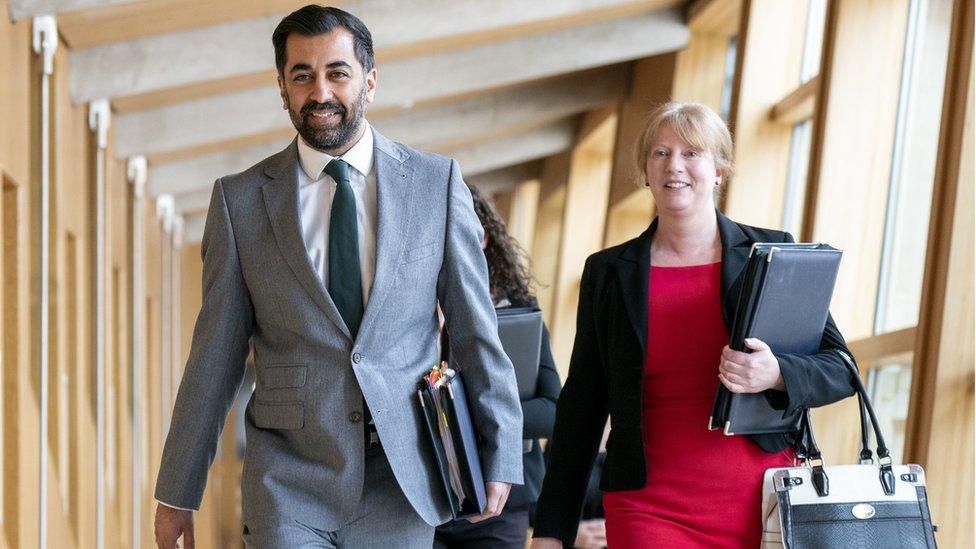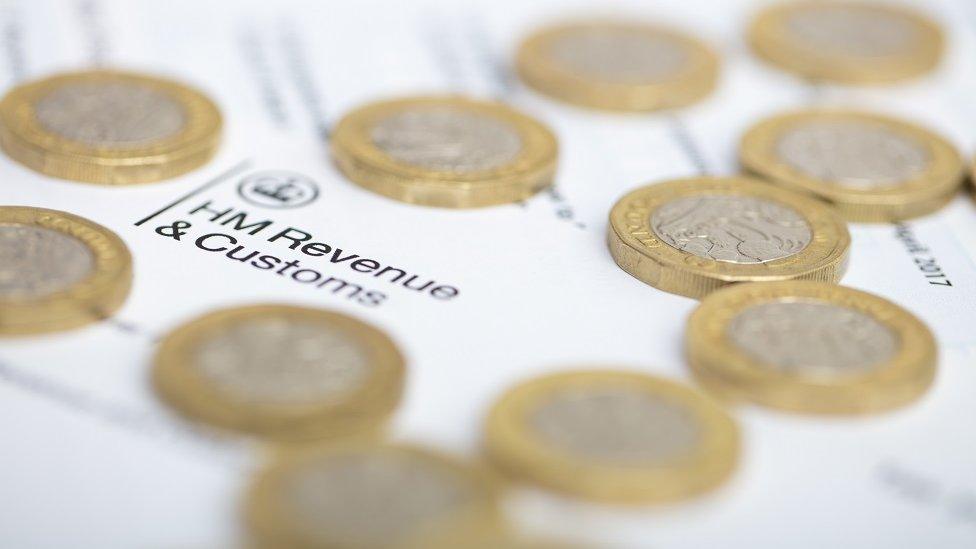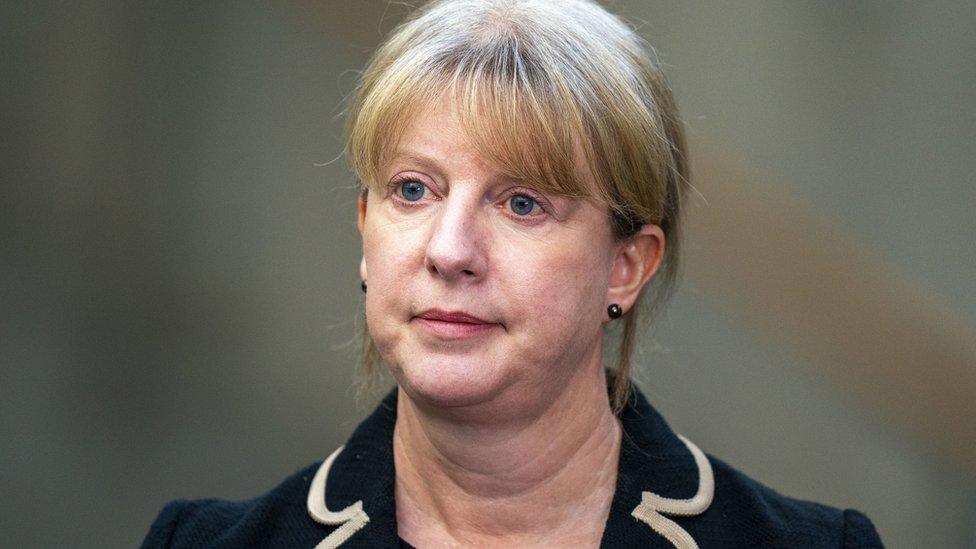Robison's spending squash
- Published

Humza Yousaf and Shona Robison have warned of touch choices ahead
A growing budget gap is forcing difficult decisions on Holyrood's finance secretary, but not yet. A big "reset" is being scheduled for later this year.
Higher tax is likely to land on rising numbers of higher earners, but those plans won't be clear for another year, while borrowing is heading for a ceiling.
Two answers: attract more taxpayers to move to Scotland from other parts of the UK, or wait for next year's election to force an easing of the chancellor's spending plans.
There are reviews, resets and refreshes. Some things will be given a "laser-like focus" of priority, meaning others will be "de-prioritised".
On her first major contribution to Holyrood as finance secretary, Shona Robison committed "to refreshing both our resource and capital multi-year spending envelopes".
Eh? What she means is... cuts. Quite significant cuts. Most of us are already having to cut 4% out of our budgets as a consequence of price inflation.
It's a lot more difficult to do with a government budget, where so much of it is already committed to public sector pay, to long-term capital projects, to political commitments, to trying to counteract the damage from a series of economic storms.
To be clear, this is not the "notional deficit" that comes with a reckoning of the spending and taxation levels that an independent Scotland might inherit at the point of departure. In that debate, the question is how much borrowing is sustainable to fund the recurring deficits of an independent Scottish Exchequer.
This is a devolved deficit, on which ministers face real questions rather than hypothetical ones, of balancing the Holyrood spending plans with the various sources of income; Westminster's block grant, a hugely complex Block Grant Adjustment and the tax that can be raised with Holyrood's own choice of thresholds and rates, notably on income.
'Broadest shoulders'
This moment of reckoning comes as no surprise. The promises and expectations have mounted up from the Scottish government, without much sign of constraint.
It sliced away at some spending salami sausage through last decade's "austerity" budgets. Councils suffered worse than most, while priorities such as childcare got the moola that goes with manifesto commitments.
Revenue from higher tax on higher earners has helped ease the fiscal pressure a bit, but not as much as required to meet those commitments and expectations.
But now, it's time for "sustainable" budgets, implying that Ms Robison's predecessors in the SNP had left her with unsustainable ones.
So in this mid-year rite in the budget process, the sixth annual appearance of the Medium-Term Financial Strategy (MTFS), Ms Robison had the task of confronting a toughened reality. She did so without making any of these choices she talks about, but by trying to set expectations - of resets, of priorities, and of "tough choices" ahead. And that's not news. The first minister has been saying that for months.
If others don't like them, they can suggest their own choices, said the cabinet secretary, with a reminder that the budget has to be balanced and with an invitation to her opponents (one they are unlikely to take up) to help her draw up plans for 2024-25.
Only half of the reckoning will be ready by late autumn, when the draft budget is usually published. Tax is being reviewed over a longer timescale, aimed at reaching decisions by the time of the seventh MTFS, a year from now.
But as we've heard from Humza Yousaf, the direction of travel is all towards higher tax, landing on "the broadest shoulders". A council of advisers is being summoned to mull over the options. The choice of its membership will be interesting, as will fiscal experts' projections of rising tax likely bringing in diminishing returns.
Generous welfare
So much for the politics. The economics of modelling taxation and spending falls to the Scottish Fiscal Commission - the independent body that overlooks St Andrew's House car park from the Calton Hill turrets of what used to be a prison governor's lodging.
It had better news, though not by much. We're no longer looking at recession, and income tax revenue is slightly better than it looked in December.
However, growth in the five-year strategy period looks anaemic. Real wage growth might break through 2% next year, but otherwise, it rises only sluggishly. Price inflation could even go to zero in the next couple of years, which is not welcome either.
And looking again at the Scottish government's spending plans, particularly with its newish welfare benefit powers, it sees bills going up sharply, and diverging from the assumptions made about that budget when Westminster sets its Block Grant.
The benefits bill is on course to rise from £5.3bn to £7.8bn in only five years. A lot of that is not being funded by getting a share of rising benefits in the Department for Work and Pensions. It has to come from cuts elsewhere or more revenue from devolved taxes.

The commission observes that one impact of freezing the threshold for paying higher rate tax just above £43,000 of annual earnings. The rate paid has gone up from 40 pence on each extra pound to 41 pence and now 42 pence. And freezing it, as pay has increased, has meant an increase of more than 70% in the number of people paying it in the past seven years, rising to 15% of taxpayers.
The Treasury is also using this "fiscal drag" to raise a lot more income tax, though the threshold has been raised since 2016, and now sits above £50,000.
A further Fiscal Commission observation worth noting is about the use of borrowing powers. There are some such at Holyrood, but they're constrained by the circumstances in which they are used.
When the finance secretary hits £3bn, that's the ceiling. It could lead to a political stand-off, with somewhat lower stakes than the one under way between the White House and US Congress.
But for now, the UK Treasury says that's all. And the Fiscal Commission says Scottish ministers are on course to have only around 10% of that headroom to handle unexpected shocks and crises.
'English are welcome'
Two footnotes to all this: one partial solution to the lack of income tax in Scotland is to attract more people. They're needed also to fill job vacancies.
The Scottish government would remind us that it wants powers over immigration, to raise the numbers, and thus help the economy.
But former business minister Ivan McKee has pointed out, from the SNP backbenches this week, that there is another option - of attracting more migrants from within the UK, either newly arrived there or lifting their deeper UK roots. No extra powers are needed for that.
The Glasgow Provan MSP wrote in The Herald: "A 20% increase in the annual number of working-age people moving to Scotland - assuming the bulk are higher rate taxpayers - could deliver an extra £1bn in income tax revenues to spend on Scottish public services over the next five years, not including the economic boost from increased spend in local shops and services."
With net immigration confirmed at record levels this week, in defiance of Conservative government promises to bring it down, the story Scotland tells about itself is that it's more welcoming to newcomers. Mr McKee's idea would be an opportunity to test that.
Turning taps
The other footnote: the Scottish government has to work with the decisions as announced by the Westminster government about the money it will make available through the Block Grant to Holyrood, and likewise to Cardiff and Stormont.
The Institute of Fiscal Studies, which knows a bit about this stuff, casts doubt on the plans so far set out by the Treasury. Through the last decade, when the rhetorical screw was being tightened by Tory Chancellors, political pressure repeatedly untightened it again.
In its current position in the polls, it seems a little unlikely that the current chancellor, Jeremy Hunt, will not ease back and open some spending taps, or possibly lower tax, thus making Shona Robison's job a bit less difficult.
Related topics
- Published25 May 2023

